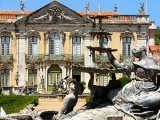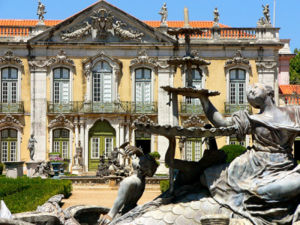
Casa do Infantado
Encyclopedia
Created in 1654 by King John IV of Portugal
, the Casa do Infantado (House of the Infante) was a wealthy Portuguese seigniory
that consisted mainly of the material goods, lands and properties confiscated from the House of Vila Real, supporters of Spain during the Portuguese Restoration War
. The Casa do Infantado belonged to and was passed on to the second-born son of each King — i.e., the Infante that was not entitled to the crown — as his appanage
. This prince was known as Senhor da Casa do Infantado (Lord of the House of Infantado) or simply Senhor do Infantado (Lord of Infantado).


As noted above, the Lords of Infantado who eventually became kings did so not because they were preordained to inherit the crown (as this was reserved for the first-born princes) but rather due to specific historical events.



John IV of Portugal
|-|John IV was the King of Portugal and the Algarves from 1640 to his death. He was the grandson of Catherine, Duchess of Braganza, who had in 1580 claimed the Portuguese crown and sparked the struggle for the throne of Portugal. John was nicknamed John the Restorer...
, the Casa do Infantado (House of the Infante) was a wealthy Portuguese seigniory
Fiefdom
A fee was the central element of feudalism and consisted of heritable lands granted under one of several varieties of feudal tenure by an overlord to a vassal who held it in fealty in return for a form of feudal allegiance and service, usually given by the...
that consisted mainly of the material goods, lands and properties confiscated from the House of Vila Real, supporters of Spain during the Portuguese Restoration War
Portuguese Restoration War
Portuguese Restoration War was the name given by nineteenth-century 'romantic' historians to the war between Portugal and Spain that began with the Portuguese revolution of 1640 and ended with the Treaty of Lisbon . The revolution of 1640 ended the sixty-year period of dual monarchy in Portugal...
. The Casa do Infantado belonged to and was passed on to the second-born son of each King — i.e., the Infante that was not entitled to the crown — as his appanage
Appanage
An apanage or appanage or is the grant of an estate, titles, offices, or other things of value to the younger male children of a sovereign, who would otherwise have no inheritance under the system of primogeniture...
. This prince was known as Senhor da Casa do Infantado (Lord of the House of Infantado) or simply Senhor do Infantado (Lord of Infantado).
Heritage
The following estates were part of the Casa do Infantado:- Palácio Nacional de Queluz (Queluz National Palace)Queluz National PalaceThe Queluz National Palace is a Portuguese 18th-century palace located at Queluz, a freguesia of the modern-day Sintra Municipality, in the Lisbon District. One of the last great Rococo buildings to be designed in Europe, the palace was conceived as a summer retreat for Dom Pedro of Braganza,...
http://www.ippar.pt/english/monumentos/palacio_queluz.html - Castelo de Santa Maria da Feira (St. Mary of Feira Castle) http://www.ippar.pt/english/monumentos/castelo_feira.html
- Palácio da Bemposta (Bemposta Palace)


Lords of Infantado
The following princes were Lords of Infantado:- Pedro de Bragança - Second son of King John IV, he became King Pedro II as the result of a coup d'étatCoup d'étatA coup d'état state, literally: strike/blow of state)—also known as a coup, putsch, and overthrow—is the sudden, extrajudicial deposition of a government, usually by a small group of the existing state establishment—typically the military—to replace the deposed government with another body; either...
sparked by the mental disability of his older brother, Afonso VI. - Francisco de Bragança - Second son of King Pedro II, he was also known as the Duke of Beja.
- Pedro de Bragança - Second son of King John V, he became King Pedro III after marrying his niece Maria I of PortugalMaria I of PortugalMaria I was Queen regnant of Portugal and the Algarves from 1777 until her death. Known as Maria the Pious , or Maria the Mad , she was the first undisputed Queen regnant of Portugal...
. - João de Bragança - Second son of King Pedro III, he became King John VIJohn VI of PortugalJohn VI John VI John VI (full name: João Maria José Francisco Xavier de Paula Luís António Domingos Rafael; (13 May 1767 – 10 March 1826) was King of the United Kingdom of Portugal, Brazil and the Algarves (later changed to just King of Portugal and the Algarves, after Brazil was recognized...
after the death of his older brother, José de Bragança. - Miguel de Bragança - Second son of King John VI, he became King Miguel I after usurping the throne from niece Maria II.
As noted above, the Lords of Infantado who eventually became kings did so not because they were preordained to inherit the crown (as this was reserved for the first-born princes) but rather due to specific historical events.




